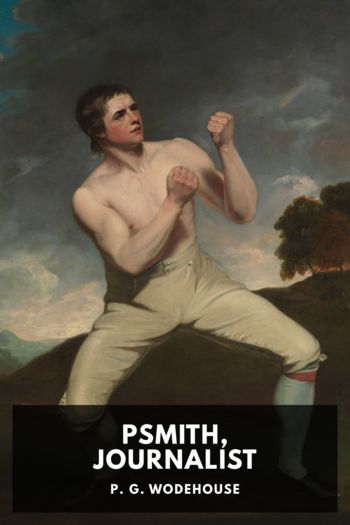Leave It to Psmith by P. G. Wodehouse (best ereader for academics TXT) 📕

- Author: P. G. Wodehouse
Book online «Leave It to Psmith by P. G. Wodehouse (best ereader for academics TXT) 📕». Author P. G. Wodehouse
“He went into the house. After,” said Baxter in a cold voice, “throwing a flowerpot at me.”
“Doing what?”
“He threw a flowerpot at me,” said Baxter, and vanished moodily.
Lord Emsworth stared at the open window, then turned to Eve for enlightenment.
“Why did Baxter throw a flowerpot at McTodd?” he said. “And,” he went on, ventilating an even deeper question, “where the deuce did he get a flowerpot? There are no flowerpots in the library.”
Eve, on her side, was also seeking information.
“Did you say his name was McTodd, Lord Emsworth?”
“No, no. Baxter. That was Baxter, my secretary.”
“No, I mean the one who met me at the station.”
“Baxter did not meet you at the station. The man who met you at the station,” said Lord Emsworth, speaking slowly, for women are so apt to get things muddled, “was McTodd. He’s staying here. Constance asked him, and I’m bound to say when I first heard of it I was not any too well pleased. I don’t like poets as a rule. But this fellow’s so different from the other poets I’ve met. Different altogether. And,” said Lord Emsworth with not a little heat, “I strongly object to Baxter throwing flowerpots at him. I won’t have Baxter throwing flowerpots at my guests,” he said firmly; for Lord Emsworth, though occasionally a little vague, was keenly alive to the ancient traditions of his family regarding hospitality.
“Is Mr. McTodd a poet?” said Eve, her heart beating.
“Eh? Oh yes, yes. There seems to be no doubt about that. A Canadian poet. Apparently they have poets out there. And,” demanded his lordship, ever a fair-minded man, “why not? A remarkably growing country. I was there in the year ’98. Or was it,” he added, thoughtfully passing a muddy hand over his chin and leaving a rich brown stain, “ ’99? I forget. My memory isn’t good for dates. … If you will excuse me, Miss—Miss Halliday, of course—if you will excuse me, I must be leaving you. I have to see McAllister, my head gardener. An obstinate man. A Scotchman. If you go into the house, my sister Constance will give you a cup of tea. I don’t know what the time is, but I suppose there will be tea soon. Never take it myself.”
“Mr. McTodd asked me to go for a row on the lake.”
“On the lake, eh? On the lake?” said his lordship, as if this was the last place in the neighbourhood where he would have expected to hear of people proposing to row. Then he brightened. “Of course, yes, on the lake. I think you will like the lake. I take a dip there myself every morning before breakfast. I find it good for the health and appetite. I plunge in and swim perhaps fifty yards, and then return.” Lord Emsworth suspended the gossip from the training-camp in order to look at his watch. “Dear me,” he said, “I must be going. McAllister has been waiting fully ten minutes. Goodbye, then, for the present, Miss—er—goodbye.”
And Lord Emsworth ambled off, on his face that look of tense concentration which it always wore when interviews with Angus McAllister were in prospect—the look which stern warriors wear when about to meet a foeman worthy of their steel.
VThere was a cold expression in Eve’s eyes as she made her way slowly to the boathouse. The information which she had just received had come as a shock, and she was trying to adjust her mind to it. When Miss Clarkson had told her of the unhappy conclusion to her old school friend’s marriage to Ralston McTodd, she had immediately, without knowing anything of the facts, arrayed herself loyally on Cynthia’s side and condemned the unknown McTodd uncompromisingly and without hesitation. It was many years since she had seen Cynthia, and their friendship might almost have been said to have lapsed; but Eve’s affection, when she had once given it, was a durable thing, capable of surviving long separation. She had loved Cynthia at school, and she could feel nothing but animosity towards anyone who had treated her badly. She eyed the glittering water of the lake from under lowered brows, and prepared to be frigid and hostile when the villain of the piece should arrive. It was only when she heard footsteps behind her and turned to perceive Psmith hurrying up, radiant in gleaming flannel, that it occurred to her for the first time that there might have been faults on both sides. She had not known Psmith long, it was true, but already his personality had made a somewhat deep impression on her, and she was loath to believe that he could be the callous scoundrel of her imagination. She decided to suspend judgment until they should be out in mid-water and in a position to discuss the matter without interruption.
“I am a little late,” said Psmith, as he came up. “I was detained by our young friend Freddie. He came into my room and started talking about himself at the very moment when I was tying my tie and needed every ounce of concentration for that delicate task. The recent painful episode appeared to be weighing on his mind to some extent.” He helped Eve into the boat and started to row. “I consoled him as best I could by telling him that it would probably have made you think all the more highly of him. I ventured the suggestion that girls worship the strong, rough, dashing type of man. And, after I had done my best to convince him that he was a strong, rough, dashing man, I came away. By now, of course, he may have had a relapse into despair; so, if you happen to see a body bobbing about in the water as we row along, it will probably be Freddie’s.”
“Never mind about Freddie.”
“I don’t if you don’t,” said Psmith agreeably. “Very well, then,





Comments (0)